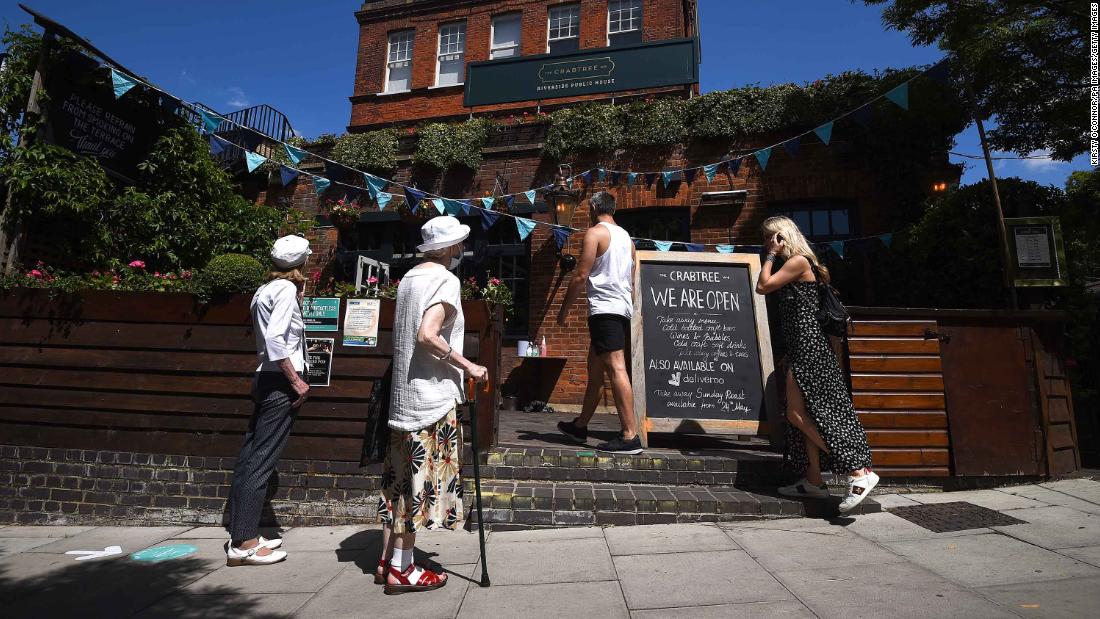
A version of this story first appeared in CNN Business' Before the Bell newsletter. Not a subscriber? You can sign up right here.
What's happening: Japan said it would end its state of emergency on Monday, while UK Prime Minister Boris Johnson said the retail sector would be allowed to reopen starting in mid-June. The New York Stock Exchange is reopening to some traders on Tuesday, though they'll be required to wear masks and practice social distancing.
Investors are also taking solace in positive vaccine developments. US biotech company Novavax said Monday that it had started its Phase 1 trial of a vaccine and expected preliminary results in July.
But major risks, of course, remain. "The rise in risk assets [is] despite consistent escalation of US-China tensions and a continuous drumbeat of negative economic data," Deutsche Bank strategist Jim Reid told clients on Tuesday.
See here: Germany's closely-watched Ifo business climate index recovered somewhat in May, according to data released Monday. But many companies are still pessimistic about their business prospects.
"This is still the second weakest reading since reunification," observed Carsten Brzeski, chief eurozone economist at ING.
And while Hong Kong stocks are bouncing back after a difficult Friday, China's move to pass a hugely controversial national security law there still threatens to fuel growing tensions between Washington and Beijing.
"Secretary [of State Mike] Pompeo would likely be unable to certify that Hong Kong maintains a high degree of autonomy," Robert O'Brien, President Donald Trump's national security advisor, said on "Meet the Press" Sunday. "And if that happens, there will be sanctions that will be imposed on Hong Kong and China."
He continued: "It's hard to see how Hong Kong could remain the Asian financial center that it's become if China takes over."
The rental car industry is in crisis. Here's what it means
Rental car companies are in deep trouble — another blow for the already struggling auto industry, my CNN Business colleague Chris Isidore reports.
Rental car companies typically account for 10% or more of US new car sales, making an estimated 1.7 million to 1.9 million purchases last year.
But rental car companies get two-thirds of their revenue from airport locations. With flying down 94% in April and May, far fewer people need to rent cars. And much of the non-airport business comes from customers involved in car accidents, with insurance companies footing the bill. But with driving way down, that business has dropped off, too.
As rental companies scramble to preserve cash, they're unlikely to buy as many new vehicles. Hertz has said it doesn't intend to buy any more cars this year. Rival Avis Budget (CAR) is in better financial shape, but said in March it would slash plans to buy new vehicles by 80%.
Attempts by rental companies to sell used cars back into the market could also exacerbate problems in the auto industry.
"I think the used market is bracing for quite an influx of vehicles which will drive prices down and put pressure on the market," Jeff Schuster, president of global forecasting at LMC, an automotive research firm, told Chris.
Higher availability of cheaper used cars could appeal to cost-conscious consumers, eating into new car sales at a tricky moment for automakers.
"All of this is interrelated," Schuster said. "It affects what consumers will buy."
Lufthansa got its bailout. Others haven't been so lucky
Lufthansa and the German government have finalized the terms of a €9 billion ($9.9 billion) bailout, following weeks of intense negotiations over the future of Europe's leading global airline. But not every struggling carrier can count on government help.
Details: The Lufthansa rescue package will give the government a 20% stake in the group, which owns airlines in Germany, Austria, Switzerland and Belgium, and two seats on its supervisory board.
"Before the pandemic, the company was healthy and profitable and had good prospects for the future, but it faces an existential emergency because of the current corona crisis," the government said in a statement Monday.
More turmoil: LATAM, Latin America's largest airline, filed for bankruptcy Tuesday. The company said it's an opportunity to pare down debt and operations will not be affected.
It's the second major airline in the region to file for bankruptcy this month, following Colombian airline Avianca.
US new home sales for April and consumer confidence data for May arrives as 10 a.m. ET.
"some" - Google News
May 26, 2020 at 06:54PM
https://ift.tt/3ghkDEa
Some markets are hitting their highest levels since March. But huge risks remain - CNN
"some" - Google News
https://ift.tt/37fuoxP
Shoes Man Tutorial
Pos News Update
Meme Update
Korean Entertainment News
Japan News Update
Bagikan Berita Ini














0 Response to "Some markets are hitting their highest levels since March. But huge risks remain - CNN"
Post a Comment